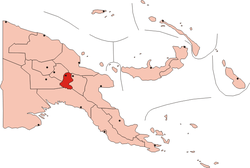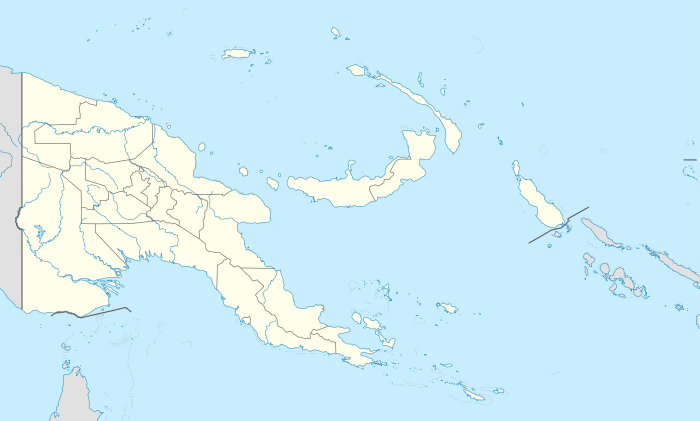Chimbu Province
| Chimbu Province Simbu Province | ||
|---|---|---|
| ||
 | ||
 Chimbu Province Location within Papua New Guinea | ||
| Coordinates: 6°26′S 145°0′E / 6.433°S 145.000°E | ||
| Country | Papua New Guinea | |
| Formation | 1966 | |
| Capital | Kundiawa | |
| Districts | ||
| Government | ||
| • Governor | Noah Kool 2012- | |
| Area | ||
| • Total | 6,112 km2 (2,360 sq mi) | |
| Population (2011 census) | ||
| • Total | 376,473 | |
| • Density | 62/km2 (160/sq mi) | |
| Time zone | UTC+10 (AEST) | |
Chimbu, occasionally spelled Simbu, is a province in the Highlands Region of Papua New Guinea. The province has an area of 6,112 km² and a population of 376,473 (2011 census). The capital of the province is Kundiawa. Mount Wilhelm, the tallest mountain in Papua New Guinea, is on the border of Simbu.
Geography
Chimbu is located in the central highlands cordillera of Papua New Guinea. It shares geographic and political boundaries with five provinces: Jiwaka, Eastern Highlands, Southern Highlands, Gulf and Madang. It is a significant source of organically produced coffee.
Chimbu is a province with limited natural resources and very rugged mountainous terrain. The economic progress of the province has been slower than some other highlands provinces.
Education
There are seven secondary schools in the province: Kondiu Rosary, Yauwe Moses, Kerowagi, Muaina, Gumine, Mt Willem and Kundiawa Day Secondary School. The province also has many high and primary schools.
Districts and LLGs
The province is subdivided into six districts, with each district further subdivided into one or more Local Level Government (LLG) areas. For census purposes, the LLG areas are again subdivided into wards and those into census units.[1]
| District | District Capital | LLG Name |
|---|---|---|
| Chuave District | Chuave | Chuave Rural |
| Elimbari Rural | ||
| Siane Rural | ||
| Gumine District | Gumine | Bomai-Kumai Rural |
| Gumine Rural | ||
| Mount Digine Rural | ||
| Karimui-Nomane District | Karimui | Karimui Rural |
| Nomane Rural | ||
| Salt Rural | ||
| Kerowagi District | Kerowagi | Gena-Waugla Rural |
| Kerowagi Rural | ||
| Kup Rural | ||
| Kundiawa-Gembogl District | Kundiawa | Kundiawa Urban |
| Mount Wilhelm Rural | ||
| Niglkande Rural | ||
| Waiye Rural | ||
| Sina Sina-Yonggomugl District (Sinasina-Yonggomugl District) |
Kamtai | Sinasina Rural |
| Suwai Rural | ||
| Yonggomugl Rural |
Politics
The current governor, Noah Kool, was elected in the 2012 national election under the new Limited Preferential Voting (LPV) system. The Governor is the head of the provincial government. The provincial bureaucracy is headed by the provincial administrator. The current acting administrator is Joseph Kunda Naur, a former educationist. He is from the Endugla/Naur tribe.
The provincial headquarters is Kundiawa, which is also the location of the province's main airport. Air Niugini makes three flights to Kundiawa each week. There are many guest houses within the proximity of Kundiawa town.
Provincial leaders
The province was governed by a decentralised provincial administration, headed by a Premier, from 1977 to 1995. Following reforms taking effect that year, the national government reassumed some powers, and the role of Premier was replaced by a position of Governor, to be held by the winner of the province-wide seat in the National Parliament of Papua New Guinea.[2][3]
Premiers (1976–1995)
| Premier | Term |
|---|---|
| Siwi Kurondo | 1976–1978 |
| Mathew Siune | 1978–1984 |
| provincial government suspended | 1984–1986 |
| Peter Gul | 1986–1988 |
| David Mai | 1988–1992 |
| Edward Bare | 1992–1993 |
| Edward Aba | 1993–1995 |
Governors (1995–present)
| Premier | Term |
|---|---|
| Yauwe Riyong | 1995–1997 |
| Louis Ambane | 1997–1998 |
| Simeon Wai | 1998–1999 |
| Louis Ambane | 1999–2003 |
| Alphonse Willie | 2003–2004 |
| Peter Launa | 2004–2007 |
| John Garia | 2007–2012 |
| Noah Kool | 2012–2017 |
| Micheal Dua Bogai | 2017-present |
Members of the National Parliament
The province and each district is represented by a Member of the National Parliament. There is one provincial electorate and each district is a local ("Open") electorate.[4]
| Premier | Term |
|---|---|
| Chimbu Provincial | Micheal Bogai Dua |
| Chuave Open | Wera Mori |
| Gumine Open | Nick Kuman |
| Karimui-Nomane Open | Geoffery Kama |
| Kerowagi Open | Bari Palma |
| Kundiawa Open | Willie Gogl Ongulgo |
| Sinasina-Yonggomugl Open | Kerenga Kua |
See also
References
- ↑ National Statistical Office of Papua New Guinea
- ↑ May, R. J. "8. Decentralisation: Two Steps Forward, One Step Back". State and society in Papua New Guinea: the first twenty-five years. Australian National University. Retrieved 31 March 2017.
- ↑ "Provinces". rulers.org. Retrieved 31 March 2017.
- ↑ "NATIONAL PARLIAMENTARY ELECTIONS 2012". PNG Electoral Commission. Archived from the original on 15 August 2012. Retrieved 12 April 2017.
- Deck, D. Sipu-u-u-u to Simbu, Paradise Magazine
